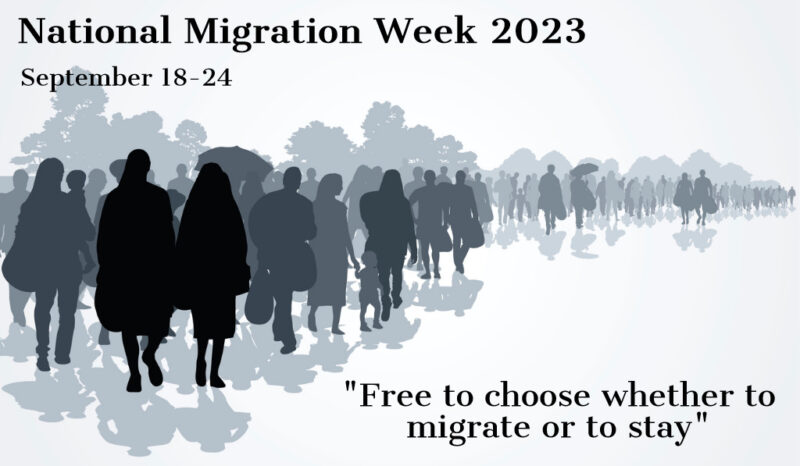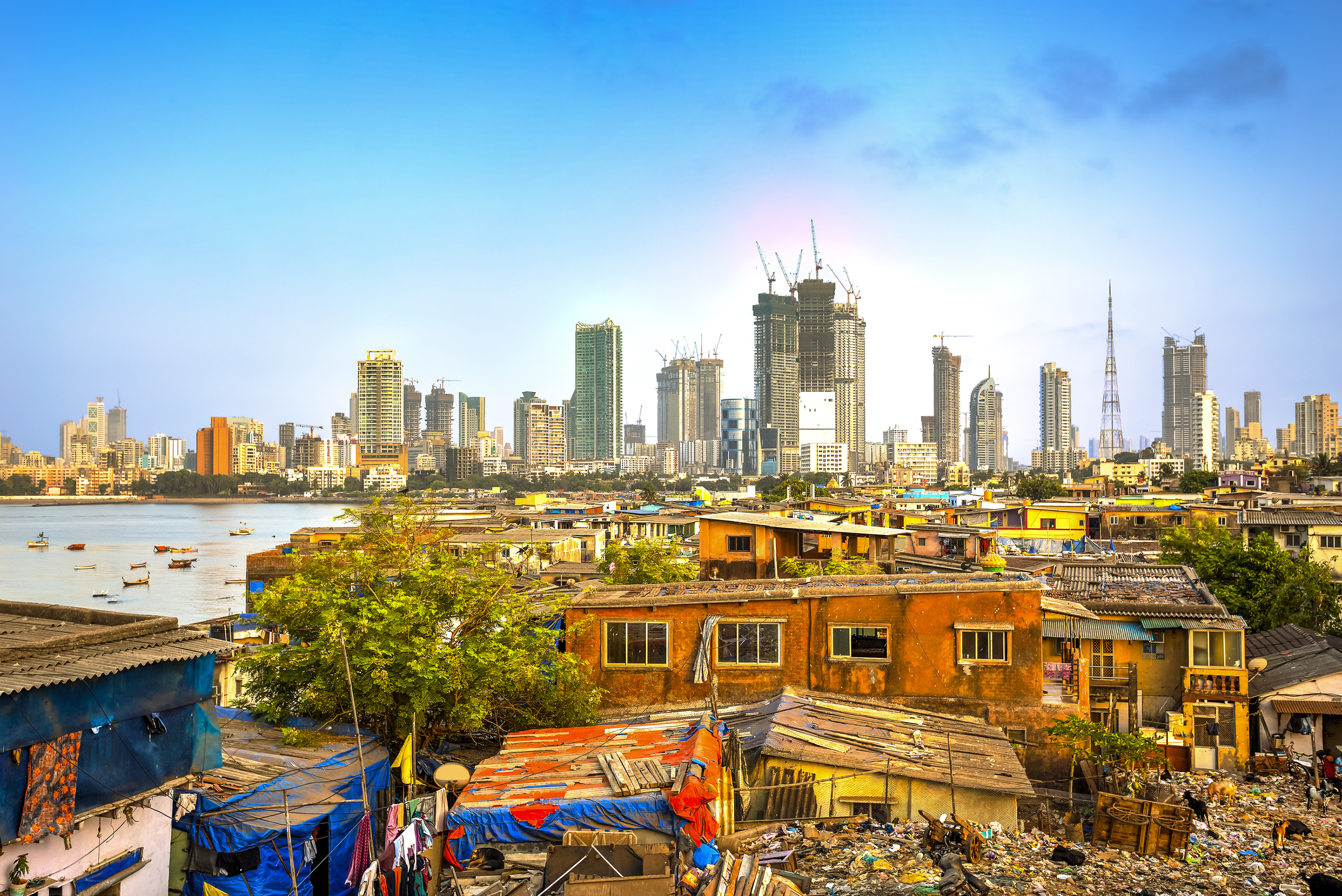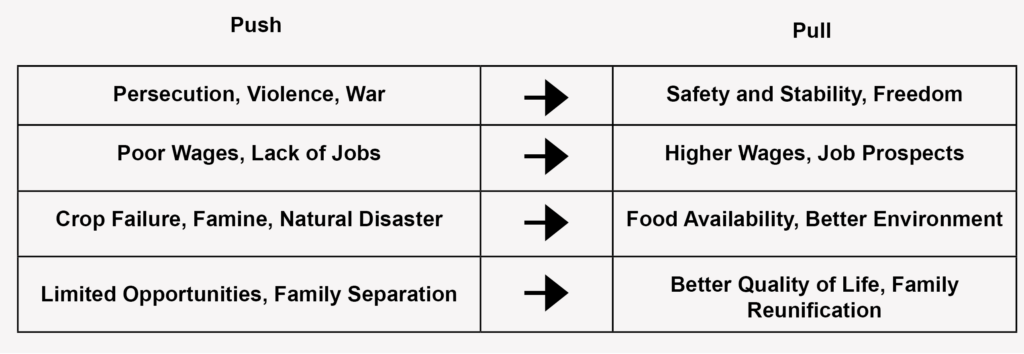
About National Migration Week
In a world marked by immense suffering, the plight of migrants and refugees stands out as a pressing global issue. The World Day of Migrants and Refugees (WDMR) is an opportunity for global church and the Catholic faithful to engage in prayer, reflection, and action on behalf of our brothers and sisters who are forced to flee their homes. National Migration Week is a uniquely US-based celebration that builds on the ideas put forth in WDMR and shaped accordingly to American public. In 2023 we will celebrate National Migration Week September 18 – 24, which culminates with WDMR that Sunday the 24th.
This year’s theme, “Free to choose whether to migrate or to stay,” shines a light on the root causes that drive migration. In many instances, war and conflict have left people with no option but to abandon their homes and seek safety elsewhere. The Syrian conflict, for example, displaced millions, creating one of the largest refugee crises in modern history. More recently, the Russian invasion of Ukraine displaced hundreds of thousands of people, many of whom fled to neighboring countries in search of safety. In both cases, migration is not a choice, but a necessity for survival.
Pope Francis emphasizes the importance of understanding the systemic factors that contribute to forced migration, such as political instability, economic inequality, and persecution. Through advocacy, education, and charitable works, Catholic faithful can work to create a world where individuals and families are free to choose whether to migrate or stay in their homelands. By addressing these issues, we can help create the conditions for people to live in safety and dignity, regardless of where they call home.
Let us use this National Migration Week and World Day of Migrants and Refugees as an opportunity to deepen our understanding of the complex issues driving forced migration and to renew our commitment to building a just and inclusive world.

Exploring the Root Causes of Migration
Mumbai cityscape with a big contrast between poverty and wealth, Maharashtra, India. Getty/Adrian Catalin Lazar
Migrants and refugees are not pawns on the chessboard of humanity. They are children, women and men who leave or who are forced to leave their homes for various reasons, who share a legitimate desire for knowing and having, but above all for being more.
– Pope Francis, 2014 World Day of Migrants and Refugees
Pope Leo XIII observed in his encyclical Rerum Novarum that “men would cling to the country in which they were born, for no one would exchange his country for a foreign land if his own afforded him the means of living a decent and happy life.” While it is true that in our global world people choose to migrate for a variety of reasons – for love, adventure, and job opportunities in distant lands – Pope Leo XIII’s point is that most people are predisposed to remain where things are familiar if given the opportunity to do so. The familiarity of local customs and language provide a sense of belonging and identity that can be difficult to replicate elsewhere. It is difficult to pick up and emigrate to a country where the language is different, access to gainful employment is hard to come by, and social mores different. But we live in a world where the choice to remain is not always a realistic one.
To understand global migration, it is thus important to understand the root causes that motivate people to migrate, often against their own desires. Within a migration context, both push and pull factors play off one another; push factors being the reason(s) why people would want to leave their home country and pull factors being the reason(s) why people would want to come to a new country. So, for example, endemic poverty in which economic opportunity is effectively absent might inspire the desire to emigrate, while the promise of gainful employment elsewhere functions as the pull factor for a person to migrate to a particular place. A myriad of other push and pull factors can also play into the decision to leave:
Persecution, Violence, and War
Safety factors can cause danger to individuals, prompting them to migrate. Persecution and discrimination based on nationality, race, religion, political beliefs, or membership status in a particular social group will prompt people to move large distances in search of living conditions where safety can reign over their lives. Danger can be imposed upon individuals by something formal, like war , or informal, such as internal strife or widespread organized national criminal activity. For example, the turbulent Northern Triangle of Central America, composed of Guatemala, Honduras and El Salvador, was described in 2018 by the U.S. Department of State as a region that “suffers from high rates of violence and crime with weak judicial systems to prosecute criminals and protect those affected.” Countless thousands of people have a left a multitude of war-torn or unsafe countries, some of whom receive little coverage in international news. Very many of those leaving their home countries have travelled through irregular means seeking safety and security in other regions of the world.
Economics and Related Social Factors
Economic migration, whether permanent or seasonal, is a commonly cited reason for migration. In general, it is believed that in economic migration people move from poorer developing areas into richer areas where wages are higher and more jobs are available. Immigration from Brazil in the last decade of the 20th century provides an example of the way in which economic factors contributed to migration patterns in the case of Brazilian immigrants in the U.S., who have cited economic reasons for leaving their home in search of prosperity elsewhere. Many sought to escape the hyperinflations that plagued Brazil up until 1994. Yet even since the late 1990s, when inflation subsided and prices stabilized, middle and lower-class Brazilians experienced an average loss of a third of purchasing power in their salaries, resulting in a wave of migrants to the United States knowing that they can earn as much as four times what they earned in Brazil working the same jobs. Declining or stagnant wealth, paired with the promise of economic prosperity elsewhere, can function as a significant impetus to migrate.
Social factors motivating migration grow from the human needs and the desire to seek opportunities absent in their homeland. Migrants often move to ensure better opportunities for themselves or their family, like sending their child to a better, safer school or finding a job that would have not only a sufficient salary, but also important benefits and career growth prospects. In terms of education, United States colleges and graduate programs have been a particularly strong attraction for young, talented individuals around the world.
Environmental Displacement
Migration caused by environmental factors is increasingly spontaneous and undertaken with little regard for personal well-being at the time. Environmental factors such as hurricanes , crop failure , pollution, and climate change may result in immediate or long-term health risks, loss of shelter, lack of viable food sources locally, or unfeasible solutions for people residing in impacted regions. In Laudato si’ (2015), Pope Francis highlighted the rise in migrants fleeing environmental degradation and calls for collective global action on both crises. The Holy Father was prescient in his calls when a few years later Hurricanes Eta and Iota rampaged through Central America and resulted in the International Red Cross estimating 1.5 million being displaced by the disasters of a “climate crisis.”
It is important to note that more than one root cause can trigger migration of people. More importantly, a consistent component of the various root causes of migration is family unity. Thus, representatives of the international Catholic church and U.S. Catholic bishops have spoken clearly about the need to maintain family units in immigration agreements and national legislation.
For Catholics, it is necessary to incorporate the principles and values of Catholic social teaching equally within the context of the root causes of migration. Catholic concepts that include human life and dignity, the common good, a preferential option for the poor and vulnerable, the dignity of work, solidarity, subsidiarity, integral human development, and welcoming the stranger.
In Strangers No Longer: Together on the Journey of Hope, the U.S. and Mexican catholic bishops emphasized the root causes that contribute to irregular migration and the importance of addressing these factors so as to stabilize local communities. Here they wrote that “Catholic teaching also states that the root causes of migration – poverty, injustice, religious intolerance, armed conflicts – must be addressed so that migrants can remain in their homeland and support their families.”

